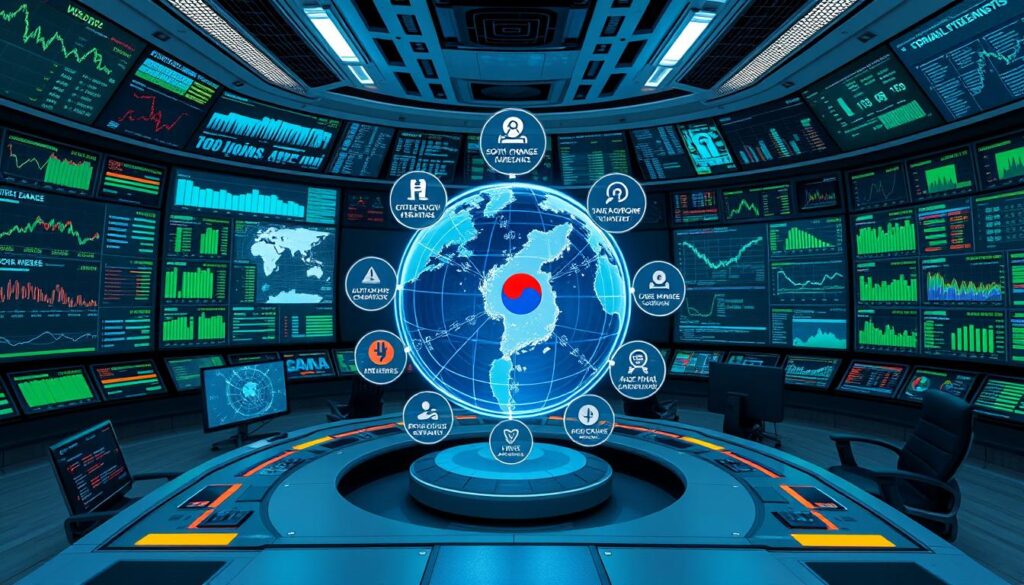Warren Buffett once said, “Risk comes from not knowing what you’re doing.” South Korea’s economy is facing many global risks. These include geopolitical tensions, cybersecurity threats, and climate change impacts.
The Korean economy must find ways to stay stable and grow. It needs to tackle these challenges head-on. This will help it face the future with confidence.
Key Takeaways
- Geopolitical instability and escalating cyber threats pose significant risks to the Korean economy.
- Supply chain disruptions and climate change impacts present major challenges that must be addressed.
- Robust corporate governance and regulatory compliance frameworks are crucial for mitigating global risks.
- Emerging markets and financial risks require careful monitoring and strategic management.
- Developing crisis management capabilities and resilience is essential for navigating uncertainties.
Geopolitical Instability and Cyber Threats
South Korea’s location and tensions with North Korea make it unstable. This increases the risk of military conflicts and trade disruptions. Its digital economy also makes it a target for cybersecurity threats, data breaches, and other digital security challenges.
Escalating Tensions and Digital Security Challenges
Recent studies show that geopolitical instability and cybersecurity threats worry global CEOs. A PwC survey found 25% of CEOs are very concerned about cyber risks due to tensions. The NotPetya attack spread fast, showing the urgency of security.
Boards and CISOs are told to do table-top exercises to understand cyber risks. They should also focus on basic cyber hygiene to improve security. But, the lack of global cybersecurity norms is a big challenge, especially with escalating tensions leading to more cyber attacks.
The digital security challenges in South Korea are seen in global conflicts. The Russia-Ukraine war and the Israel-Hamas conflict show cyber attacks on critical infrastructure. As geopolitical tensions shape cyber warfare, nations and companies must work together to defend against these threats.
“Cyber adversaries are increasingly targeting supply chain vulnerabilities, evolving ransomware attacks to include information exfiltration and extortion methods.”
Supply Chain Disruptions
South Korea’s economy relies heavily on global supply chains. These chains face many disruptions. This affects manufacturing, logistics, and the flow of goods, impacting the economy.
Disruptions come from the spread-out nature of supply chains. They are more likely to face shocks like natural disasters and trade disputes. The COVID-19 pandemic has also played a role. These issues affect everything from high-end products to basic needs like drugs and energy.
Taiwan’s control over semiconductors is another big issue. Semiconductors are key but expensive and hard to make. This control can lead to conflicts, especially with the People’s Republic of China (PRC).
| Impact of Supply Chain Disruptions | Mitigation Strategies |
|---|---|
|
|
Companies are adding digital tools to their distribution. This helps with real-time monitoring and inventory tracking. But, more than just tech is needed. Keeping workers healthy and using data wisely are also key.
The future of supply chains looks uncertain. The next decade will likely see more disruptions. It’s crucial for everyone to work together to avoid conflicts and keep supply chains running smoothly.
“Supply chain interdependence is likely to persist for the next decade, creating risks that are not fully appreciated, especially in the face of external shocks like natural disasters.”
Climate Change Impacts
South Korea faces big challenges from climate change. Rising sea levels, extreme weather, and less resources are big environmental risks. These risks can harm important infrastructure, farming, and energy.
To tackle these issues, South Korea needs strong adaptation strategies. It must move towards more sustainable ways. This includes using more renewable energy.
Environmental Risks and Adaptation Strategies
The Earth has warmed by 1.1 degrees since before humans started burning fossil fuels. We’re seeing more heat waves, droughts, and wildfires. For example, the American West is in its worst drought in 1,200 years.
Wildfires in California have burned 500 percent more land since 1972. South Korea must act fast to protect its people and buildings. It needs to:
- Build stronger coastal defenses against rising sea levels
- Use new farming methods to grow food even when it’s dry
- Make energy use more efficient and invest in renewable energy
- Get better at handling extreme weather events
By acting now, South Korea can create a safer, greener future. It will protect its economy and keep its people happy and healthy.
Global Risk Management Strategies
Proven, Sophisticated, and Customizable Solutions
Managing global risks needs advanced tools and strategies. GlobalRisk offers top-notch, customizable solutions for financial institutions, corporations, and policymakers. Their platform uses risk analytics to help organizations make smart decisions and stay strong against global challenges.
GlobalRisk’s risk mitigation tools use the latest technology. They give a full view of risk exposure. From predictive analytics to real-time monitoring, their solutions help businesses prepare for and handle global risks.
Every business faces different challenges. GlobalRisk’s financial risk management solutions are tailored to fit each company’s needs. They work closely with clients to create strategies that match their risk profiles, ensuring the best risk management and resilience.
“GlobalRisk’s advanced risk analytics and customizable solutions have been instrumental in helping us navigate the complex global landscape. Their platform has provided us with the insights and agility we need to make informed decisions and protect our business from a wide range of risks.”
GlobalRisk has a strong track record of success. Their innovative approach to risk analytics and mitigation has won the trust of top organizations worldwide. By teaming up with GlobalRisk, businesses can make better decisions with data and stay ahead in the changing global scene.
Corporate Governance and Regulatory Compliance
Strong corporate governance and regulatory compliance are key in South Korea’s fast-paced business world. Following best practices in board oversight, risk management, and financial reporting helps companies. This way, they can handle the complex rules and protect their reputation and finances.
Mitigating Risks through Robust Frameworks
Governance, Risk, and Compliance (GRC) is now a major focus in the 21st century. It helps companies manage their governance, risk, and compliance well. GRC is especially important for big companies with many rules to follow.
Using GRC policies and software can bring big benefits. These include lower costs, better security, and ongoing compliance. Companies using GRC can also avoid penalties and reduce risks in all areas.
GRC software brings together different GRC functions in one package. This helps companies follow a clear plan for their GRC strategy. Some popular GRC software includes Diligent HighBond, IBM OpenPages, and ServiceNow Governance, Risk, and Compliance.
Having a solid GRC framework improves decision-making and operations. It also boosts cybersecurity. Key players in GRC include top executives, legal teams, finance managers, HR, and IT. They work together to reduce risks and keep the business running smoothly.
“Effective corporate governance and regulatory compliance are the cornerstones of sustainable business growth in today’s complex and volatile environment.”
Emerging Markets and Financial Risks
South Korea’s economy is linked to emerging markets, which brings financial risks. These risks include currency changes, market ups and downs, and unclear rules. It’s key to manage these risks well to keep South Korea’s financial system stable and attract foreign investment.
Since the early 2000s, emerging markets have been a hot spot for investors. But, they come with their own set of challenges. Currency fluctuations can affect the return on foreign investments. Also, emerging market securities can’t be valued like those in North America because of their unique distributions.
Emerging markets are less liquid than developed ones, leading to higher fees and price uncertainty. Weak corporate governance in these markets can lead to weaker stock returns and a higher bankruptcy risk. Political risks include uncertainty about government actions, war, tax hikes, subsidy losses, and policy changes.
| Emerging Market | Key Characteristics |
|---|---|
| China | Significant growth potential, large and less liquid markets, evolving regulatory environment |
| India | Rapidly expanding economy, diverse industries, infrastructure challenges |
| Brazil | Commodity-dependent economy, political instability, currency volatility |
| South Africa | Mineral-rich, uneven development, social and economic inequalities |
Emerging markets have great growth potential but also come with risks like political instability and currency volatility. To tackle these challenges, it’s crucial to understand the economic and political landscape well. Also, using advanced risk management strategies is essential.
Crisis Management and Resilience
In today’s world, crisis management and resilience are key for South Korean companies and policymakers. The world faces many disruptive events. Being able to handle these with agility is now crucial.
Navigating Uncertainties with Agility
Agility is vital to reduce the impact of global risks on businesses and the economy. South Korean firms need strong crisis management plans. They should use advanced analytics and digital tools to improve supply chain resilience and cybersecurity.
According to the Global Crisis and Resilience Survey 2023, nearly 60% of respondents say their organizations are well-prepared for resilience. Over 75% of companies have set up safety and remote work measures. This shows they are ready to face challenges.
But, the survey found that only a few firms have a full plan for future disruptions. They need to be more proactive in managing crises and building resilience. Investing in scenario planning and risk culture can improve their foresight and adaptability.
“Developing the agility to navigate crises is no longer a luxury, but a necessity for businesses and economies to thrive in the modern global landscape.”
Companies that focus on crisis management and resilience can better handle global risks. By being adaptable and always improving, South Korean companies can lead in the future.
Global Risk Monitoring and Assessment
It’s crucial to watch and assess global risks to protect South Korea’s economy. Using data analytics, predictive modeling, and risk assessment tools helps. These tools give insights for making smart decisions to keep the economy strong.
The GRAF, or Global Risk Assessment Framework, helps UNDRR’s partners understand risk changes. It’s funded by the United States and Germany to boost efforts in reducing risk. This framework supports action for resilience in different situations.
GRAF Pillar 1 works on making risk data easier to access and use. It aims to help decision-makers. GRAF Pillar 2 focuses on creating new information and analysis. It uses new methods to understand complex risks better.
| GRAF Pillar | Focus Area |
|---|---|
| Pillar 1 | Strengthening access, analysis, and visualization of risk data |
| Pillar 2 | Generating new types of information products, research, and analysis |
| Pillar 3 | Providing technical support and tools to enhance the capacity of in-country stakeholders |
| Pillar 4 | Influencing agenda setters and financing systems to accelerate and deepen the implementation of risk reduction measures |
GlobalRisk is a top name in risk management software. They work with exchanges, banks, and more. Over 90% of their customers find out about them through happy customers. This shows GlobalRisk is a trusted and innovative choice for risk monitoring and assessment.
By using data analytics, predictive modeling, and risk frameworks, South Korea can tackle global threats. This ensures the country’s economy stays stable and grows, even with changing risks.
Conclusion
South Korea’s economy is at risk from many global threats. These include political instability, cyber attacks, supply chain problems, climate change, and regulatory issues. To tackle these global risks, a detailed plan is needed. This plan should include smart risk mitigation strategies, strong corporate governance, and a focus on economic resilience.
Recent surveys show that climate change, digital disruptions, and other environmental and social risks are top concerns. These risks can cause big problems for the Korean economy. Their combined effects could lead to severe crises.
South Korea can protect its economy by tackling these risks head-on. By working together, the country can find new solutions, improve corporate governance, and build a resilient culture. This will help it stay strong in the face of changing global risks.













